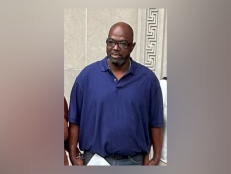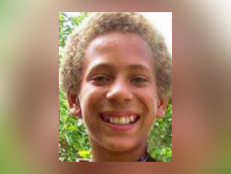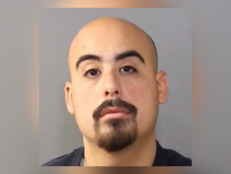Independent Probe Of Elijah McClain’s Death Accuses Police, Paramedics Of Wrongdoing
Aurora, Colorado, law enforcement officials “failed to ask basic, critical questions about the justification for the use of force,” panel’s report claims.
![Elijah McClain [screenshot via ABC News]](http://investigationdiscovery.sndimg.com/content/dam/images/investigationdiscovery/crimefeed/legacy/2021/03/elijah-mcclain-abc-news-03012021.png.rend.hgtvcom.616.462.suffix/1614648914167.png)
Elijah McClain [screenshot via ABC News]
Independent investigators recently issued a scathing 157-page report on the case of Elijah McClain, a Black man who died in Colorado in August 2019 after police put him in a chokehold and paramedics injected him with ketamine.
The Aurora City Council ordered the report last July after millions of people signed an online petition demanding officials reexamine the death of the 23-year-old massage therapist.
“The body-worn camera audio, limited video, and [Aurora Police Department] Major Crime’s interviews with the officers tell two contrasting stories,” states the report, which was released on Feb. 22 and obtained by ABC News. “The officers’ statements on the scene and in subsequent recorded interviews suggest a violent and relentless struggle.”
“The limited video, and the audio from the body-worn cameras, reveal Mr. McClain surrounded by officers, all larger than he, crying out in pain, apologizing, explaining himself, and pleading with the officers,” the report notes.
As Crimefeed previously reported, McClain was walking home from a convenience store in Aurora, a suburb of Denver, on the evening of Aug. 24, 2019.
At 10:32 p.m., 911 dispatchers received a call about a “sketchy” Black male who was wearing a ski mask and “acting weird.”
McClain, who loved ones have described as a gentle “oddball,” often wore the mask because of a chronic health condition. The night of the incident, he had on headphones and initially may not have heard officers telling him to stop.
However, according to the investigative report, the three Aurora Police Department officers who responded to the call — Nathan Woodyard, Randy Roedema and former officer Jason Rosenblatt — had no legally justified reason to detain and frisk McClain or subdue him with force.
“Upon review of the evidence available to the Panel, Officer Woodyard’s decision to turn what may have been a consensual encounter with Mr. McClain into an investigatory stop — in fewer than ten seconds — did not appear to be supported by any officer’s reasonable suspicion that Mr. McClain was engaged in criminal activity. This decision had ramifications for the rest of the encounter,” the report reads.
“The responding officers applied pain compliance techniques and restraints to Mr. McClain continuously from the first moments of the encounter until he was taken away on a gurney,” investigators state in the report, adding, “The officers also sat or kneeled on Mr. McClain.”
During the incident, the report notes, “[McClain’s] words were apologetic and confused, not angry or threatening.”
The panel also found paramedics allegedly gave 500 milligrams of ketamine to McClain to subdue him but the amount was “based on a grossly inaccurate and inflated estimate” of how much he weighed by 40 to 80 pounds.
“Despite his apparent distress and the fact that a carotid control hold had been applied, the body-worn camera footage does not reflect any attempt by Aurora Fire to examine or question Mr. McClain before the administration of ketamine,” the report claims. “At the time of the injection, Mr. McClain had not moved or made any sounds for about one minute.”
After losing consciousness, McClain was taken to the hospital. He died three days later.
The Aurora Fire Rescue has since banned paramedics from administering ketamine.
Following the incident, the independent investigators allege in the report, Major Crimes Unit detectives in the Aurora Police Department “failed to present a neutral, objective version of the facts and seemingly ignored contrary evidence” and “failed to ask basic, critical questions about the justification for the use of force.”
The report claims the Major Crimes Unit, which handled the city’s probe rather than Internal Affairs, “stretched the record to exonerate the officers rather than present a neutral version of the facts.”
Among other recommendations, the panel concluded the Aurora Police Department should add more de-escalation techniques training for officers and overhaul its use-of-force policy.
In response to the new report, McClain's family and their lawyers said in a joint statement that the case “is a textbook example of law enforcement’s disparate and racist treatment of Black men.”
"Aurora’s continued failure to acknowledge the wrongdoing of its employees only exacerbates the problem,” the statement reads.
The paramedics and policemen involved in the incident have not faced prosecution and remain on the job, with the exception of Rosenblatt, who was fired last year after a photo surfaced of him and two other Aurora officers mocking McClain’s chokehold death, the Washington Post reported.
Dave Young, the former district attorney for Adams and Broomfield Counties, said prosecutors were unable to pursue charges related to McClain’s passing because they could not “disprove the officers' reasonable belief in the necessity to use force.”
The McClain family is currently pursuing a wrongful death lawsuit against both the Aurora Fire and Rescue Department and the Aurora Police Department.
“Elijah believed in humanity and that humanity mattered,” McClain’s mother, Sheneen McClain, said in a statement. “Inhumane humans are a problem and we must stop unjust laws.”







![Michael Peterson [left] and Kathleen Peterson [right] smile. He is wearing sunglasses, a white shirt, and a hat and she is wearing a black shirt.](http://investigationdiscovery.sndimg.com/content/dam/images/investigationdiscovery/crimefeed/legacy/2022/04/an-american-murder-mystery-the-staircase-S1-E1.png.rend.hgtvcom.231.174.suffix/1651263591477.png)

